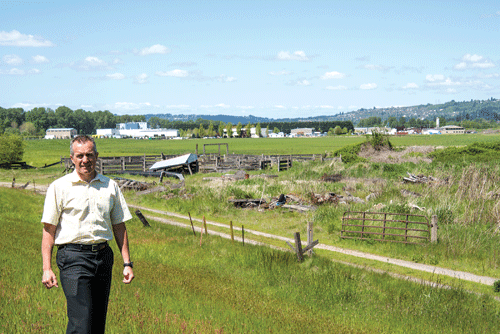 13 years ago, when Janette Munizich founded The Scrub Shop, she did so hoping to offer a service beyond the typical catalog ordering experience for medical professionals in need of workplace uniforms. Today, alongside her fellow co-workers, Munizich is working to bring that service to new industries with an expanded product line and rebranding effort – all while preparing to move into a new, larger location this summer.
13 years ago, when Janette Munizich founded The Scrub Shop, she did so hoping to offer a service beyond the typical catalog ordering experience for medical professionals in need of workplace uniforms. Today, alongside her fellow co-workers, Munizich is working to bring that service to new industries with an expanded product line and rebranding effort – all while preparing to move into a new, larger location this summer.
Earlier this month, construction began on the future home of DRESScode, Home of The Scrub Shop. The new location, at 8300 Mill Plain Blvd. near PeaceHealth Southwest Medical Center in Vancouver, will provide the company with nearly double the square footage of their current location (off of NE Andresen Rd.). The new name, DRESScode, coincides with how they will utilize that extra space.
“As The Scrub Shop, we’ve been providing medical uniforms like scrubs,” Munizich explained. “Now we’ve rebranded the store to be DRESScode and we’re expanding to carry uniforms for different types of professions.”
According to DRESScode co-owner DeeDee Hatler, the product expansion has been in the works for about a year and will allow the company to be “an umbrella for all uniform needs,” including tactical wear, spa wear, food industry garments and eventually more service-oriented small businesses like plumbers, auto garages and construction companies.
“It’s about trying to change the payer system so we are working to keep people healthy, not just paying for acute care,”
explained Kevin Witte, who serves on the RHA’s Board of Directors. “It’s so that we’re not waiting for people to get sick or letting things go.”
As part of the reform effort, the state issued a mandate that requires funding for physical health, mental health and chemical dependency to be completely integrated by the year 2020. The state then asked counties if they would be interested in becoming early adopters by implementing reforms in 2016.
With the support of the RHA, three counties in Southwest Washington (Clark, Skamania and Klickitat) signed up to become early adopters.
“As the counties have made their decisions and the legislation has gotten clearer, it has really enabled the RHA to more firmly define its role in our community and how we fit within the reform efforts of the state,” said Jon Hersen, VP of strategy at Legacy Health System and chair of the SWRHA Board. “The RHA is supporting the early adopter model and will basically mirror the county representation by serving as the ACH for our region.”
Not lost among members of the RHA, which include representatives from Legacy, Kaiser and PeaceHealth, are concerns from the business community over the current state of health care reforms. Among those concerns are low reimbursement rates for Medicaid. Several care providers, such as The Vancouver Clinic, have already closed their doors to new Medicaid patients.
“Reimbursement levels and how we live within the budget we have to care for this population is at the core of what we are trying to accomplish,” said Hersen. “How do we take that money and design and deliver care in a more efficient, effective manner that increases outcomes, increases the health of the population and does it in a less costly manner? That issue is really fundamental to everything we talk about and is fundamental to the goals we are trying to achieve.”
By summer’s end, the state will look to award additional funding to select alliances across the state to test and pilot the ACH concept. In the meantime, the RHA is hoping to get increased involvement from the local community.
“We’ve got a community advisory council that we’re putting together and we’re asking for applications to join,” said Witte. “What we want is a diverse cross-section of the population including Medicaid users, but also people that can represent a number of different areas. It’s a place for the community to start having real feedback.”
Those interested in applying for advisory council membership are asked to contact Kristin Gilmer at kgilmer@lhs.org no later than July 18, 2014.
“2016 is only a year and a half away, so we’re moving into a phase where the next 12 months are really critical for [determining] what will be,” Witte added.
{jathumbnail off}







